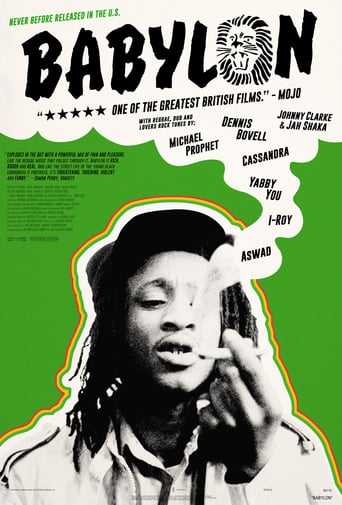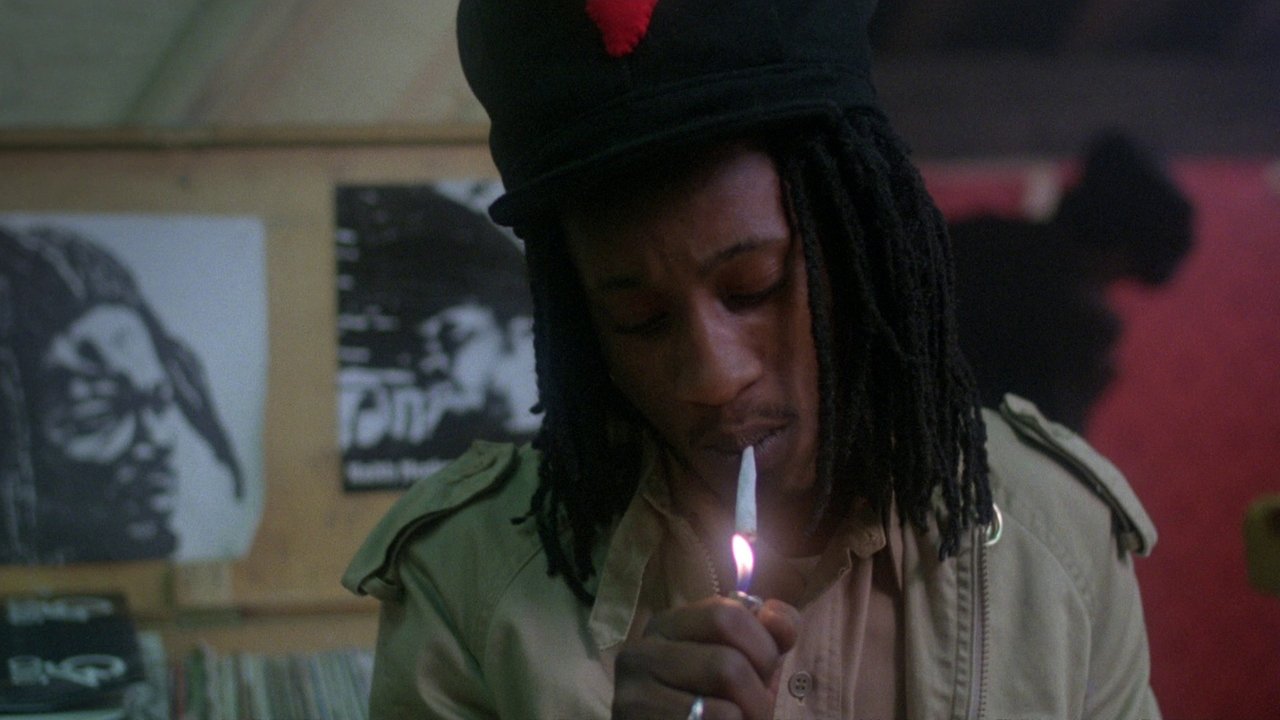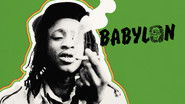pjames10
Look, I'm glad I saw Babylon. Low budget cult, yes. And as my man maphubaird said, it takes itself a little too seriously. For me, The film had 4-6 gorgeous, modern shots. Shots that showed the East End ( Might has well as been the Bronx the same period) in it's long lensed and well framed "bald reality." Yet, the story was clumsy. Only the blazing of a big head on my part assisted in long term watching of "Babylon" . BUT!!! I will celebrate the soundtrack in the fullest as well as big up the "winding section" That was some of the most loping and genuine film I'd ever seen.Bottom line, I watched a third generation video tape dub (EAT ASS MPAA!) and still thoroughly enjoyed this film. And to tell the truth, a good 89% of my friends would enjoy it too( I know the "gorilla in the midst" in me liked it.)We all like these stories, these immigrant, overcoming odds stories... Just let's not be predictable. Maybe This film was a victim of it's time and misguided white influence, maybe it was the hack writer from Quadrophenia. All for naught.The energy is there, it's just the timeless art that's missing. More good shots, less cliché, more BK reality and Babylon would be as prescient now as it was in the 80's.ps-Big Up if you came here from the Don Letts interview!!!
Ali Catterall
There are two pivotal exchanges in Babylon, each involving the most volatile member of the 'Ital Lion' sound system. On being informed that "this was a lovely area before you came here," Beefy, played by a young Trevor Laird, replies (in pure saarf London tones) "This IS my country, lady and it's never been lovely, it's always been a tip for as long as I can remember." The second, equally telling exchange occurs when Ronnie (Howman of 'Brush Strokes' fame) attempts to point out that not all "his kind" are evil, after the destruction of the Lion's DJ equipment by marauding racists. "I'm a National Front guy?" he protests. "Dem a deal in pure wickedness, man!" Beefy, seeing red and using a pronounced Jamaican accent this time, informs him "Don't talk black, white man" and brutally headbutts him to the ground. As Frantz Fanon wrote in 1952's 'Black Skin, White Masks', "It is this automatic manner of classifying him, imprisoning him, decivilising him, that makes him angry." It is precisely these issues of cultural identity, and of cultural preservation, that lie at the heart of Babylon, an early and important milestone in black British film-making. Filmed in and around Deptford, Lewisham and Brixton, it's a social-realist portrait of young, working-class, second-generation black Londoners under siege. As Horace Ove's immediate forebear Pressure foreshadows the Notting Hill riots of 1976, so Babylon seems blessed (or cursed) with equal prescience, fermenting with the kind of racial tension that would spectacularly ignite in Britain's inner cities a few months after its release.Sacked by his racist boss, two-timed by his girlfriend, beaten up by plain-clothes police - and not least, after his sound system is smashed up, dreadlocked MC 'Blue' (Aswad's Brinsley Forde) finally loses it and stabs a likely white offender with a screwdriver. All the same, he manages to get to the semi-finals of a sound competition just in time to blow away their rival - the otherwise unassailable Jah Shaka, cameoing as himself - with a borrowed sound system and a well-played ace: Aswad's mighty 'Warrior Charge', snake-hip slinky and triumphal as a lion's roar.In the tradition of classic music movies, this hugely influential tune is key to the entire film; what the whole damn thing hinges on. As Lloyd Bradley writes in 'Bass Culture', his seminal history of reggae, "'Warrior Charge' was the sound's secret weapon, the tune which, entirely believably, was going to annihilate all comers in the dancehall." As an army of police mass outside, and through a blue fug of ganja smoke, the wanted man toasts a plea for liberation: "Four hundred years it's the same kind of living/Pain and misery all that Babylon is giving/I can't take no more of that, no I can't take no more of that", a chant taken up by the crowd, as the police sledgehammer at the dancehall door in time with the beat, in a final and brilliantly juxtaposed mimesis.Here, for the first time in British cinema, was a portrayal of Rastafarianism and British reggae culture at odds with the 'multi-racist' society and state. Following the death of the Emperor Haile Selassie in 1975, the Rastafarian religion had steered a more secular path: a politicised doctrine emphasising passive resistance against the agents of subjugation and oppression. The 'dread' music and culture highlighted in Rosso's film is seen as a catalytic, liberating force, during an era of 'Sus' stop-and-search laws, and in which reggae clubs and blues parties were being systematically shut down. Attack the sound and you attack the community.Babylon has fewer ideas than Pressure, but makes up for it with sheer sound and fury, galvanised by the punk era; as Alexander Walker writes in 'National Heroes', this "was not a mediation movie but a red alert". Despite its uncompromising outlook it should not be too surprising that Babylon was directed, produced and written by whites, given the gated nature of the industry; that it owes something to the previous year's Quadrophenia in its thematics and narrative arc may also have been unavoidable, given its screenwriter co-wrote both films.Five years is a long time in subculture: this is a tauter film than Pressure, pitched at a transformed generation: younger, more self-assured. Pressure's check suit jackets and pork pie hats have given way to casual sportswear, dreads and the African tricolour.The sounds have become harder too - "hard like concrete" - drenched in reverb, echo and searing sonic sun splashes, with Shaka's soundsystem making judicious use of the 'Synare 3' drum machine. Babylon's core viewers would have less time for speechifying, favouring the immediate impact of a wardrobe-sized speaker cabinet over Pressure's Black Panther-style orations.Not that audiences got much of a chance to catch it: panicked that black Britons under the age of 18 would misread the film as an incitement to violence, the BBFC saddled it with a limiting 'X' certificate. BBFC secretary James Ferman reassured, "We all believe that it will become a classic of its type and be around for many years, so that black youngsters who cannot see it today will have their chance before very long." But following its cinema run, Babylon went underground. With no VHS or DVD release (even the soundtrack wasn't reissued on CD until 2005), the film instead collected a cult following via second-generation recordings, taped off the telly during either of its two screenings on Channel 4 during the 1980s.At time of writing, to be young, British, working class, of any racial origin, and not to "talk black" is to deviate from the norm. Back in 1975, Horace Ove proposed subtitling certain passages of dialogue in Pressure to aid the "language problem"; a request turned down by distributors on the grounds that "what they're saying isn't very important - after all, we get the gist of it." For Babylon's UK DVD release, the subtitles accompanying the esoteric vernacular have been entirely removed.
d-leehim
you dun even CAAAAARRRREE!!!" Hard hitting film about black youths growing up in south london during the 80s, dealing with racism. The scenes where the two white police officers beat up the hero are chilling and brutally realistic. In the 70's black youth embraced rastafari and the movement allowed them to form their own identity and stay united. Brindsley Forbes is excellant, as is the soundtrack by aswad. Check out warrior charge "tune is had like concrete!" DUBPLATE!!! Why is this excellant film not on DVD or video? It has been shown on channel 4 once before and I did have it on tape but lost it.Nowadays the only way to see it is by renting it from some black music/video shops if you can find it. Yes ronnie is the guy from brush strokes. "Fat larry your one crook" "Brixton y'acall dis?" The only OTHER film that has lyrics like this is The Harder They Come. If anyone has this on video can you please contact me so I can get a copy!Cheers!
bengoldacres
this film is wicked. the music is bad, in the michael jackson sense of the word, the plot is hilarious and the whole thing is filmed around brixton which is lovely if you live there. and its got the bloke from brush strokes in it.





 AD
AD


